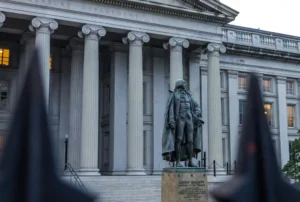November 11, 2012; Source: New York Times
Will the re-elected President Barack Obama push for campaign finance reform now that he is freed from having to defeat the multi-million dollar donations of the likes of Sheldon and Miriam Adelson (who bankrolled a big chunk of his opposition to the tune of more than $50 million)? Writing for the New York Times, Nicholas Confessore argues that “the president’s re-election does not presage a repudiation of the deregulated campaign financing unleashed by the Supreme Court’s 2010 Citizens United decision. Instead, his victory most likely reinforced the practice.” How is that possible, given that the wealthiest donors largely went against him?
Sign up for our free newsletters
Subscribe to NPQ's newsletters to have our top stories delivered directly to your inbox.
By signing up, you agree to our privacy policy and terms of use, and to receive messages from NPQ and our partners.
In Confessore’s view, “ultimately, Mr. Obama did not beat the super PACs; he joined them.” Confessore cites the Priorities USA Action super PAC started by former White House aides, which was helped when “the president dispatched high-ranking campaign and administration officials around the country, where they beseeched small groups of millionaires and billionaires to contribute large checks.” Confessore observes that Priorities USA Action spent $66.5 million on attack ads by the end of the election and that the Priorities USA spending “along with tens of millions of dollars in pro-Obama spending by other super PACs and outside groups…substantially evened the score against Republicans and their allies.” As he did in 2008, Obama eschewed public campaign financing and the limitations that come with it, making himself a prolific attendee at fund-raisers, far more so than any other incumbent president.
Obama also succeeded in attracting a large number of donations from small donors. The net effect is that the Obama campaign did very well among small donors and more than competed with Romney on large donors. The result, according to Confessore, is that Obama and the Democrats may have little inclination to jimmy with the campaign finance system since they’ve been victorious with its various levers. The logic is that if you win an election—decisively in this case—under the current campaign finance rules, you are disinclined to modify them, especially when the fix that is really need includes getting a ton of the big money out of elections and creating and enforcing a regime of mandatory public disclosure that donors to the “independent” 501(c)(4)s will be loathe to accept—even if it comes at the cost of elements of small “d” democracy.
Is the analysis that the weakening of the democratic process by big money is worth tolerating if your side wins? If our nation’s political leaders appear to have little innate interest in reforming campaign finance on their own, doesn’t this sound like a call to arms for the nonprofit sector? In his acceptance speech, the president’s list of agenda priorities failed to mention Citizens United. Shouldn’t nonprofits redouble efforts to clean up the campaign finance rot that so many tax-exempt organizations know is debilitating to grassroots democracy?—Rick Cohen












